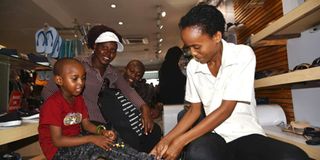Premium
No signs of school shopping

A shop attendant assists Peter Ngugi to fit a new pair of shoes at a Bata Shop in Mwembe Tayari, Mombasa, in January 2019. The shops are among other businesses yet to experience a surge in customers in readiness for back to school.
What you need to know:
- School Outfitters in Nairobi’s central business district has hardly sold any school items since mid-March.
Sky Max Collection, wholesalers of uniform in Nairobi, had only received a few enquiries from retailers, with a handful of purchases.
Since March, Mr Njagi revealed, publishers have been supplying school content to the Ministry of Education free of charge through the Kenya education cloud.
Dealers in stationery, uniform and other school supplies have for the past few days been upbeat that their businesses will pick up after a six-month downturn occasioned by the Covid-19 pandemic.
The optimism was sparked by the announcement by Education Cabinet Secretary George Magoha that schools will reopen next month.
However, a spot check by the Nation at bookshops, uniform outlets, publishing firms, laboratory equipment sellers, hostels and food suppliers in Nairobi showed schools and parents were yet to start making purchases in readiness for resumption of learning in October.
And in the absence of the shopping rush that usually characterises the back-to-school season, there are fears of bleak times ahead for businesses that depend on learning institutions to stay afloat.
School Outfitters in Nairobi’s central business district, which supplies uniform, stationery and other items to more than 400 primary and secondary schools, colleges and universities in Nairobi, Kiambu and other metropolitan counties, has hardly sold any school items since mid-March.
Face masks
“Things are thick. Ever since students went home, we just sat here and would be lucky to sell even face masks worth Sh100,” said Mr Kaser Nazir.
Even after stocking things like face masks, he added, they couldn’t keep their 80 employees and had to scale down to the current 22.
Even the announcement on reopening of schools hasn’t helped much. “So far, we haven’t received any orders; neither for uniform nor face masks,” Mr Nazir said.
He blames lack of clarity on the opening date and the hard economic times for inability or unwillingness by schools and parents to do back-to-school shopping.
Sky Max Collection, wholesalers of uniform in Nairobi, had only received a few enquiries from retailers, with a handful of purchases.
“I have only seen three customers today; one took a trouser, the other a sweater and the third something I can’t remember. Parents don’t seem to trust the government to open this soon,” said a worker.
30 per cent discount
The situation was the same at Uniform Distributors nearby, which was offering a 30 per cent discount to entice customers.
A number of bookshops in the city remain closed, with those in operation doing little or no business. Mr Pardeep Rehal of Savani’s Book Centre, said although they avoided laying off staff by putting everyone on a pay cut, the inevitable was about to happen.
The establishment, which has more than 50 employees, normally places bulk orders towards January.
“Usually, as the peak season draws near, we begin planning around November to cater for about 4,000 customers. But, as things stand now, we’re likely to end up with dead stock,” said Mr Rehal.
Kenya Publishers Association (KPA) chairman Lawrence Njagi told the Saturday Nation that the sector is yet to feel the impact of the planned schools reopening.
“We are, however, optimistic that when schools reopen in October, we will not lose as much as we had feared,” he said, adding that failure to reopen schools would cost publishers a whopping Sh20 billion this year. “So far, we have lost up to Sh7 billion,” he said. KPA had written to the Ministry of Education opposing a plan to force learners to repeat classes, saying such a decision would see publishers lose a lot of business.
Since March, Mr Njagi revealed, publishers have been supplying school content to the Ministry of Education free of charge through the Kenya education cloud.
Not everyone is complaining, though. For laptop shops, the Covid-19 pandemic brought with it booming business.
Electronic gadgets
Since May, many schools, colleges and universities have been asking learners to buy the electronic gadgets as a basic requirement for virtual classes.
An attendant at a shop along Moi Avenue said, this month alone, they have sold more than 200 laptops. At Bata shops, the back-to-school sections remained deserted, despite offering a 50 per cent discount on their shoes.
Major supermarkets are yet to advertise back-to-school offers, pointing to the probability that they aren’t quite sure about the opening date.
The Saturday Nation’s survey also established there was little activity among suppliers of maize, beans, green grams, vegetables, soap, cooking flour and other foodstuffs to schools.
Qwetu Hostels, which houses students from more than 12 universities in Nairobi, has begun advertising accommodation for students on their website.
Private Schools Association chief executive Peter Ndoro has since warned that some 131 schools with 44,000 learners will not be able to open.






